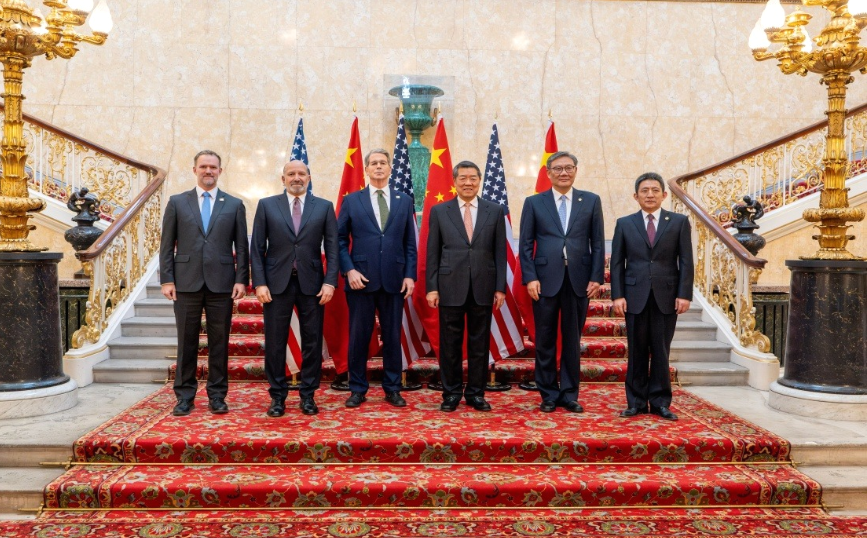China-U.S. economic dialogue concludes, eyeing future cooperation

Vice-Premier He Lifeng (third from right) and other Chinese officials pose for a group photo with US representatives on Monday, ahead of the first meeting of the China-United States economic and trade consultation mechanism in London, the United Kingdom. Photo/Agencies
The first meeting of the China-U.S. economic and trade consultation mechanism has concluded in London, marking an important step toward implementing the consensus reached by the two heads of state and stabilizing bilateral trade relations.
China has always promoted dialogue with utmost sincerity and is committed to resolving differences through equal consultation while firmly safeguarding its core interests and development rights. The U.S. side should honor its commitments, work in the same direction as China and avoid politicizing trade issues in order to jointly contribute to the stability of global industrial and supply chains.
In recent years, China has continued to advance high-level opening-up and improve its business environment, offering broad market opportunities to foreign investors, including U.S. companies. The actual use of foreign capital has remained stable, and the share of investment in high-tech industries continues to rise, demonstrating global confidence in China's economy.
In emerging sectors such as new energy, the digital economy and artificial intelligence (AI), China adheres to market-based principles. Its growing industrial competitiveness is driven by technological innovation and economies of scale, not by so-called unfair competition.
In fact, China does not deliberately pursue trade surpluses. According to statistics, China's current account surplus as a percentage of GDP dropped from 9.9 percent in 2007 to 2.2 percent in 2024, reflecting continued structural improvements in China's foreign trade. The U.S. trade deficit with China, as a share of its total goods trade deficit, also declined from 47.5 percent in 2018 to 24.6 percent in 2024.
Although the potential for U.S. exports to China has not been fully realized – largely due to U.S. domestic policy constraints – China remains committed to high-level opening-up and has actively expanded imports, creating more opportunities for countries around the world.
On June 9, when the London meeting started, China's foreign trade once again demonstrated strong resilience and adaptability. According to the General Administration of Customs, China’s total goods trade in the first five months of this year reached 17.94 trillion Chinese yuan (about $2.5 trillion), an increase of 2.5 percent year-on-year, with export growth accelerating to 7.2 percent. These figures reflect overall stability in China's trade, showing that U.S. trade pressure has had limited impact and that China's strategy of trade diversification is proving effective.
Facing the new round of a trade war triggered by the U.S., China's confidence is not only based on trade diversification, but also on several solid foundations.
Firstly, its massive consumer market. In 2024, China's total retail sales of consumer goods approached approximately 50 trillion yuan, up 3.5 percent year on year in 2024. Secondly, the complete industrial chain. China is the only country with all 41 industrial categories in the UN industrial classification system and leads globally in fields such as photovoltaics, lithium batteries and home appliances.
Moreover, its robust financial firewall. The RMB Cross-Border Interbank Payment System covers more than 180 countries, while China's foreign exchange reserves remained above $3.2 trillion by the end of 2024. Furthermore, technological self-reliance. Domestic production of semiconductors is accelerating. China leads in new energy technologies and holds significant influence in setting AI and 5G standards.
An automated production site at the final assembly workshop of Chang'an Auto Digital Intelligence Factory, in Yubei District of southwest China's Chongqing, March 6, 2025. /Xinhua
An automated production site at the final assembly workshop of Chang'an Auto Digital Intelligence Factory, in Yubei District of southwest China's Chongqing, March 6, 2025. /Xinhua
Despite both China and the U.S. having expressed willingness to strengthen communication and avoid misjudgment, the U.S. side has more often than not failed to honor its words. While claiming "no intention to contain China," it has stepped up technological blockades; while calling for "stable relations," it has provoked China on core issues. Such contradictions severely damage mutual trust and undermine the outcomes of previous consultations.
If the U.S. truly seeks stability in economic relations, it should abandon hegemonic thinking and respond to China's legitimate concerns with concrete actions.
For example, stop the unjust suppression of Chinese companies, including lifting restrictions on firms like Huawei and TikTok; ease high-tech export controls and genuinely uphold the principle of fair competition, rather than using "national security" as a pretext for protectionism; recognize that increased tariffs on Chinese goods go against market principles while burdening American households; and return to resolving disputes through market-based mechanisms; end extraterritorial jurisdiction, such as obstructing third-party countries from cooperating with China.
The China-U.S. economic and trade relationship is vital to the well-being of both peoples and to global economic stability. China firmly believes that cooperation and mutual benefit are the only right path forward. The London consultations offer a new opportunity for narrowing differences – but whether substantive progress can be made depends on whether the U.S. is truly willing to engage on an equal footing and honor its commitments.
(The writer Chen Xi is a special commentator on current affairs for CGTN.)